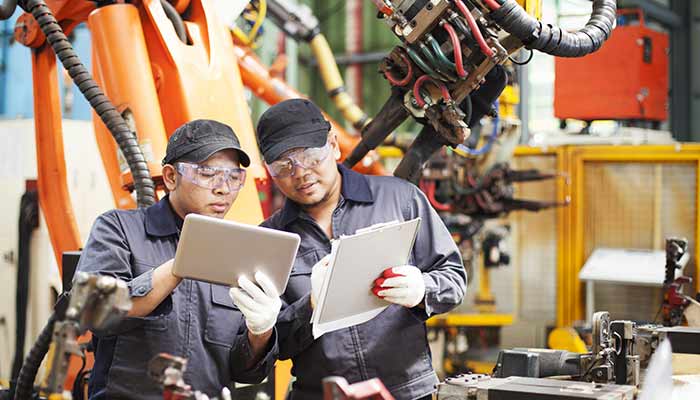News and Events
The robotics industry is constantly changing and evolving. New robotics technologies and developments in automation are quickly creating exciting career opportunities at every education level – from micro-credentials to PhDs. Here is where you can learn more about robotics careers in manufacturing and how these new technologies are benefiting workers


NEWS
Industrial Robots - Articulated
January 25, 2023We've all heard people described as being articulate, but it's perhaps a concept you haven't heard used in the context of robotics. Well, as it happens, articulation is a core component of robotics in manufacturing, and is a phenomenally important concept for anybody who hopes to one day work in robotics in general. Articulated robots are paving the way for a new generation of industrial robots, with expanded capabilities and access to axes of motion that were previously impossible in industrial robotics.
What Is Articulation, and What is an Articulated Robot?
Articulation is the ability of a robotic arm to move multiple joints and axes in order to achieve different positions. It's what allows industrial robots to reach out and grab things, move around workspaces and complete complex tasks that humans could otherwise not do.
For example, picture a robotic arm with a claw attached. It can move the claw up and down, rotate it left and right, extend its reach outwards, and many other combinations of movements that allow the claw to grab objects from different directions and angles. This is all thanks to articulation.
Articulated robots are the most common type of industrial robot in manufacturing, and is the type of robot typically used in assembly lines. Articulated robots are programmed through a combination of manipulating physical parameters and programming codes, which gives them high precision and accuracy when performing tasks, as is desirable in industrial robots and manufacturing applications.
The Benefits of Articulated Robots in Manufacturing
Articulated robots bring many benefits to industrial processes. Firstly, they bring a level of efficiency that simply can't be achieved in manufacturing without the help of robots. They can work extremely quickly and accurately, meaning tasks that would otherwise take many hours of manual labor can be completed in a fraction of the time with an articulated robot.
Additionally, since articulated robots are programmed to perform very specific tasks, they do not require any additional training once the program is set up. This step forward in user-friendliness is a welcome addition to the world of industrial robots, as integrating these industrial robots is often one of the bigger challenges faced by manufacturing organizations that are getting started in automation.
Finally, articulated robots also allow for a much higher degree of precision and accuracy in manufacturing processes. This helps to ensure better quality control, as it means that parts are more accurately made with fewer mistakes or defects.
Articulated Industrial Robots Require Skilled People
While articulated robots can greatly enhance a manufacturer's speed and productivity, they also come with some caveats of their own. The biggest of those is the need for skilled robotics workers to work alongside those super efficient robots. Like any application of industrial robots, the need for a thorough understanding of the machine in the people who work with them is critical.
These people who work with articulated robots in manufacturing are called robotics technicians. They're skilled in maintaining, programming, and troubleshooting robots when necessary. They are absolutely essential to the operation of any industrial robot in a factory, as without them the robot might be able to execute its programmed task, but won't be able to do anything else. Especially not when a problem arises, which is inevitable over a long enough period of time. On a long enough timeline, everything eventually breaks, and industrial robots are no exception. Luckily, there’s a lucrative career to be found in fixing them.
Robotics technicians are highly sought after and well paid due to the complexity of their job. For those who are interested in a career working with industrial robots, a robotics technician career is a great point of entry and, for many, the perfect job.
But How Do I Become a Robotics Technician?
If the idea of working with articulated industrial robots is one that really gets your gears turning, then you're in luck. As it happens, the requirements for a career as a robotics technician aren't all that grueling or time-consuming. In fact, you generally only need a 2-year degree or a trade school robotics certification to get started. That might sound like a lot to you if you're already working in another field to provide for yourself and your family, but there's no reason that your education can't be completed on your own time via online or hybrid courses. Working with industrial robots can be a rewarding, lucrative, and long-lived career, and the sooner you start, the sooner you can be reaping these benefits.
Right here, in fact, on RoboticsCareer.org, you'll find a search tool on our home page that will help you find the perfect robotics training program for you. For example, you can search for "robotics technician," and then filter the results by your preferred format, including online, on-site, or hybrid.
If you caught on to the fact that we started talking about articulated industrial robots, and then ended up talking about robotics careers in manufacturing, then you're not mistaken. The fact is that there is a major demand for skilled robotics workers across, well, across everywhere. What that means for you is that right now is the perfect time to start your path to a career as a robotics technician. If you’ve been thinking about where you want your career to go, and industrial robots strike your fancy, you owe it to yourself to check out some of our resources and learn more about a career in robotics.
Well, what are you waiting for? Go find the program for you!


